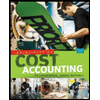The Gilster Company, a machine tooling firm, has several plants. One plant, located in St. Cloud, Minnesota, uses a job order costing system for its batch production processes. The St. Cloud plant has two departments through which most jobs pass. Plant-wide overhead, which includes the plant manager’s salary, accounting personnel, cafeteria, and human resources, is budgeted at $400,000. During the past year, actual plantwide overhead was $385,000. Each department’s overhead consists primarily of depreciation and other machine-related expenses. Selected budgeted and actual data from the St. Cloud plant for the past year are as follows. Department A Department B Budgeted department overhead (excludes plantwide overhead) $ 153,000 $ 439,900 Actual department overhead 170,000 459,900 Expected total activity: Direct labor hours 50,000 25,000 Machine-hours 15,000 53,000 Actual activity: Direct labor hours 50,500 23,900 Machine-hours 15,800 55,000 For the coming year, the accountants at the St. Cloud plant are in the process of helping the sales force create bids for several jobs. Projected data pertaining only to job no. 110 are as follows. Direct materials $ 21,600 Direct labor cost: Department A (3,000 hr) 45,000 Department B (1,100 hr) 10,000 Machine-hours projected: Department A 230 Department B 1,200 Units produced 15,000 c-1. The sales policy at the St. Cloud plant dictates that job bids be calculated by adding 27 percent to total manufacturing costs. What would be the bid for job no. 110 using the overhead rate from part a? c-2. The sales policy at the St. Cloud plant dictates that job bids be calculated by adding 27 percent to total manufacturing costs. What would be the bid for job no. 110 using the overhead rate from part b? c-3. Which of the overhead allocation methods would you recommend?
Process Costing
Process costing is a sort of operation costing which is employed to determine the value of a product at each process or stage of producing process, applicable where goods produced from a series of continuous operations or procedure.
Job Costing
Job costing is adhesive costs of each and every job involved in the production processes. It is an accounting measure. It is a method which determines the cost of specific jobs, which are performed according to the consumer’s specifications. Job costing is possible only in businesses where the production is done as per the customer’s requirement. For example, some customers order to manufacture furniture as per their needs.
ABC Costing
Cost Accounting is a form of managerial accounting that helps the company in assessing the total variable cost so as to compute the cost of production. Cost accounting is generally used by the management so as to ensure better decision-making. In comparison to financial accounting, cost accounting has to follow a set standard ad can be used flexibly by the management as per their needs. The types of Cost Accounting include – Lean Accounting, Standard Costing, Marginal Costing and Activity Based Costing.
The Gilster Company, a machine tooling firm, has several plants. One plant, located in St. Cloud, Minnesota, uses a
| Department A | Department B | ||||||
| Budgeted department overhead | |||||||
| (excludes plantwide overhead) | $ | 153,000 | $ | 439,900 | |||
| Actual department overhead | 170,000 | 459,900 | |||||
| Expected total activity: | |||||||
| Direct labor hours | 50,000 | 25,000 | |||||
| Machine-hours | 15,000 | 53,000 | |||||
| Actual activity: | |||||||
| Direct labor hours | 50,500 | 23,900 | |||||
| Machine-hours | 15,800 | 55,000 | |||||
For the coming year, the accountants at the St. Cloud plant are in the process of helping the sales force create bids for several jobs. Projected data pertaining only to job no. 110 are as follows.
| Direct materials | $ | 21,600 | |
| Direct labor cost: | |||
| Department A (3,000 hr) | 45,000 | ||
| Department B (1,100 hr) | 10,000 | ||
| Machine-hours projected: | |||
| Department A | 230 | ||
| Department B | 1,200 | ||
| Units produced | 15,000 | ||
c-1. The sales policy at the St. Cloud plant dictates that job bids be calculated by adding 27 percent to total
c-2. The sales policy at the St. Cloud plant dictates that job bids be calculated by adding 27 percent to total manufacturing costs. What would be the bid for job no. 110 using the overhead rate from part b?
c-3. Which of the overhead allocation methods would you recommend?
Trending now
This is a popular solution!
Step by step
Solved in 4 steps with 2 images









